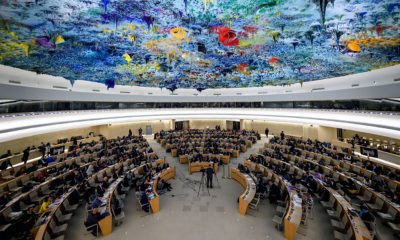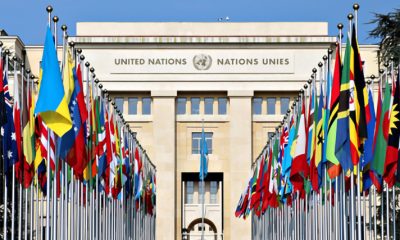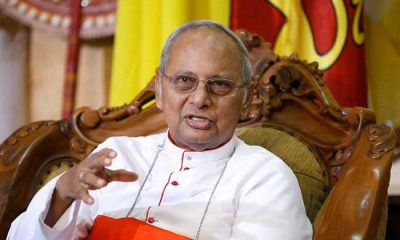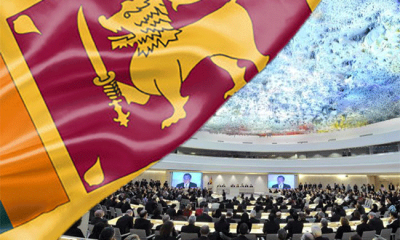News
UNHRC adopts Universal Periodic Review outcomes of Lanka, etc.
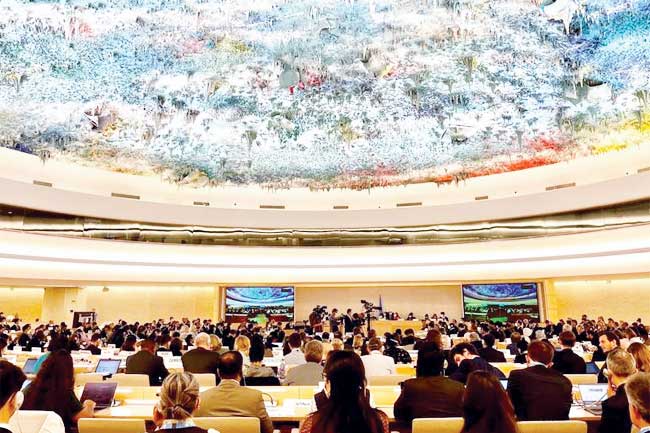
The Human Rights Council on Monday adopted the Universal Periodic Review outcomes of Pakistan, Japan and Sri Lanka.
With regard to Sri Lanka, the Vice-President of the Council said that out of the 294 recommendations received, 173 enjoyed the support of Sri Lanka, and 121 were noted.
Speaking in the discussion on the Universal Periodic Review outcome of Sri Lanka were Japan, Lao People’s Democratic Republic, Libya, Maldives, Morocco, Nepal, Nigeria, Oman, Pakistan, Philippines, Russian Federation, Singapore, South Africa and UN Women.
Also speaking were Lawyers for Lawyers, Franciscans International, Federatie van Nederlandse Verenigingen tot Integratie Van Homoseksualiteit – COC Nederland, World Evangelical Alliance, CIVICUS – World Alliance for Citizen Participation, Human Rights Watch, Christian Solidarity Worldwide, Humanists International, Stichting Global Human Rights Defence, and Amnesty International.
Consideration of Universal Periodic Review Outcome of Report
The Council has before it the report of Sri Lanka (A/HRC/53/16) and its addendum (A/HRC/53/16/Add.1).
Presentation of Report
Sri Lanka said the Government was taking significant steps to address national reconciliation issues, while at the same time making every effort to pursue economic reforms to mitigate the recent challenges faced by the country. All recommendations were carefully examined by the Government. Following this extensive process, Sri Lanka had decided to support 173 recommendations and take note of 115. There were a significant number of recommendations pertaining to the prevention of terrorism act, and the Government had undertaken to repeal the act as a voluntary pledge. Sri Lanka remained committed to pursuing efforts to achieve tangible progress in national reconciliation through domestic mechanisms with the assistance of international partners.
In guaranteeing fundamental freedoms, the Constitution of Sri Lanka provided permissible restrictions to ensure that the freedom of speech and expression, and of peaceful assembly and association were subject to such restrictions as may be prescribed by law in the interests of national security, as well as racial and religious harmony. Sri Lanka supported all recommendations received on trafficking in persons and committed to continue efforts towards combatting all forms of trafficking in persons, including of women and children. Measures were being taken to address violence against women through the adoption of a national policy on gender equality and women’s empowerment. Sri Lanka would continue to work towards implementing the recommendations that were supported by the Government.
Discussion
In the discussion, a number of speakers congratulated Sri Lanka for accepting 173 recommendations and for their efforts to promote and protect human rights in the country. Speakers hailed progress made on human rights thanks to the ratification of several international treaties. It was commendable that Sri Lanka had accepted recommendations related to poverty reduction and equal education. The country had also taken appropriate measures to ensure mental health services and to implement mental health awareness raising campaigns. Speakers hailed efforts undertaken by Sri Lanka to implement national plans to attain the Sustainable Development Goals. The country’s efforts in strengthening the social protection system and providing relief to those most affected by the COVID-19 pandemic were appreciated. The adoption of Sri Lanka’s first national action plan on women, peace and security was also commended.
Some speakers said that Sri Lanka should repeal all discriminatory legal provisions, including those in the Penal Code. There needed to be increased efforts to address gender discrimination. In Sri Lanka, lawyers were increasingly the subject of harassment and discrimination, particularly those working on sensitive cases such as minority rights. Sri Lanka was urged to implement all recommendations to protect human rights defenders and take all efforts to protect lawyers. The Government was also called on to discharge activists and protesters who were facing court cases due to arbitrary arrests, and to remove all legislation which targeted activists.
A number of speakers said the Office of Missing Persons, established in 2017, remained central to the Government’s intention to establish the fate of thousands of victims of enforced disappearance. However, it had failed to complete an investigation in even a single case, and had widely lost the confidence of victims’ families. Members of Tamil communities also continued to face harassment, intimidation and arrest for conducting events to memorialize victims of the conflict, or for staging protests demanding accountability for abuses.
The challenges faced by Sri Lanka due to the global crisis were recognized by some speakers, and it was important for the country to implement recommendations in a way that best suited their social standards. They supported the adoption of the report of Sri Lanka and wished the country every success in the implementation of all accepted recommendations.
The Vice-President of the Council said that out of the 294 recommendations received, 173 enjoyed the support of Sri Lanka, and 121 were noted.
Concluding Remarks
Sri Lanka said it was important to work towards the realisation of universal human rights based on genuine dialogue and cooperation, and devoid of politicisation, selectivity or discrimination. As the Minister of Foreign Affairs stated during the review in February, the government was keen to use this opportunity as a catalyst for the realistic assessment of challenges, to learn from the past and to build better and stronger in moving forward. Sri Lanka accepted that the primary responsibility for the promotion and protection of human rights and fundamental freedoms rested with the State concerned. States undertook this responsibility in accordance with their national policies, cultural norms and constitutional framework. Sri Lanka attached equal value to all human rights and was firmly of the view that the right to development was equally important. Sri Lanka had supported all recommendations received pertaining to human rights and the environment.
The Council then adopted the decision on the outcome of the Universal Periodic Review process of Sri Lanka.
News
US sports envoys to Lanka to champion youth development

The U.S. Embassy in Colombo welcomed the U.S. Sports Envoys to Sri Lanka, former National Basketball Association (NBA) and Women’s National Basketball Association (WNBA) players Stephen Howard and Astou Ndiaye, from June 8 through 14.
The Public Diplomacy section of the U.S. Embassy said that it would launch a weeklong basketball program intended to harness the unifying power of sports, made possible through collaboration with Foundation of Goodness and IImpact Hoop Lab.
While in Sri Lanka, Howard and Ndiaye, both retired professional basketball players, will conduct a weeklong program, Hoops for Hope: Bridging Borders through Basketball. The Sports Envoys will lead basketball clinics and exhibition matches and engage in leadership sessions in Colombo and Southern Province for youth aged 14-18 from Northern, Uva, Eastern and Western Provinces, offering skills and leadership training both on and off the court. The U.S. Envoys will also share their expertise with the Sri Lanka Basketball Federation, national coaches, and players, furthering the development of basketball in the country. Beyond the clinics, they will collaborate with Sri Lankan schoolchildren to take part in a community service project in the Colombo area.
“We are so proud to welcome Stephen and Astou as our Sports Envoys to Sri Lanka, to build on the strong people-to-people connections between the United States and Sri Lanka,” said U.S. Ambassador Julie Chung. “The lessons that will be shared by our Sports Envoys – communication, teamwork, resilience, inclusion, and conflict resolution – are essential for leadership development, community building, equality, and peace. The U.S. Sports Envoy program is a testament to our belief that sports can be a powerful tool in promoting peace and unity.”
News
Rahuman questions sudden cancellation of leave of CEB employees

SJB Colombo District MP Mujibur Rahuman in parliament demanded to know from the government the reasons for CEB suspending the leave of all its employees until further notice from Thursday.
MP Rahuman said that the CEB has got an acting General Manager anew and the latter yesterday morning issued a circular suspending leave of all CEB employees with immediate effect until further notice.
“We demand that Minister Kanchana Wijesekera should explain this to the House. This circular was issued while this debate on the new Electricity Amendment Bill was pending. There are many who oppose this Bill. The Minister must tell parliament the reason for the urge to cancel the leave of CEB employees,” the MP said.However, Speaker Mahinda Yapa Abeywardena prevented Minister Wijesekera responding to the query and said that the matter raised by MP Rahuman was not relevant.
News
CIPM successfully concludes 8th Annual Symposium

The Chartered Institute of Personnel Management (CIPM) successfully concluded the 8th Annual CIPM Symposium, which took place on 31st May 2024. Themed “Nurturing the Human Element—Redefining HRM in a Rapidly Changing World,” the symposium underscored the pivotal role of human resource management (HRM) in today’s dynamic global landscape. Since its inception in 1959, CIPM has been dedicated to advancing the HR profession through education, professional development, and advocacy, solidifying its position as Sri Lanka’s leading professional body for HRM.
Ken Vijayakumar, the President of the CIPM, graced the occasion as the chief guest. The symposium commenced with the welcome address by the Chairperson, Prof. Arosha Adikaram, followed by the Web Launch of the Symposium Proceedings and Abstract Book by the CIPM President. The event featured distinguished addresses, including a speech by Chief Guest Ken Vijayakumar, President of CIPM, and an address by Guest of Honor Shakthi Ranatunga, Chief Operating Officer of MAS Holdings Pvt. Ltd., Sri Lanka.
The symposium also featured an inspiring keynote address by Prof. Mario Fernando, Professor of Management and Director of the Centre for Cross Cultural Management (CCCM) at the University of Wollongong, Australia.
Vote of Thanks of the inauguration session was delivered by Dr. Dillanjani Weeratunga, Symposium Co-chair.
The symposium served as a comprehensive platform for researchers to present their findings across a wide range of critical topics in HRM. These included Cultural Diversity and Inclusion, Talent Development and Retention, Ethical Leadership and Corporate Social Responsibility, Adapting to Technological Advancements, Mental Health and Well-being at Work, Global Workforce Challenges, Employee Empowerment, and Reskilling and Upskilling.
The plenary session was led by Prof. Wasantha Rajapakse. Certificates were awarded to the best paper presenters during the valedictory session, followed by a vote of thanks delivered by Kamani Perera, Manager of Research and Development.
The annual symposium of CIPM was a truly inclusive event, attracting a diverse audience that spanned undergraduates, graduates, working professionals, research scholars and lecturers. This widespread interest highlights the symposium’s significance in the field of HRM, offering a unique opportunity for everyone to network and learn from scholarly brains.The CIPM International Research Symposium was sponsored by Hambantota International Port, Sri Lanka Institute of Information Technology (SLIIT), E B Creasy & Co. PLC, and Print Xcel Company.


